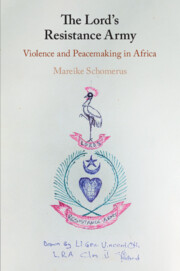Book contents
- The Lord’s Resistance Army
- The Lord’s Resistance Army
- Copyright page
- Contents
- Figures
- Acknowledgements
- Note on the Text
- Abbreviations and Acronyms
- 1 Introduction
- 2 The Lord’s Resistance Army
- 3 The Juba Peace Talks with the Lord’s Resistance Army in 2006
- 4 ‘Am I an Animal?’
- 5 The Juba Peace Talks with the Lord’s Resistance Army in 2007
- 6 ‘Reach Out a Hand and Pull It Back’
- 7 The Juba Peace Talks with the Lord’s Resistance Army in 2008
- 8 ‘LRA Has Already Become a System’
- 9 ‘We Are All Learning in This Peace Process’
- References
- Index
8 - ‘LRA Has Already Become a System’
Representation and Distrust in the Lord’s Resistance Army
Published online by Cambridge University Press: 09 April 2021
- The Lord’s Resistance Army
- The Lord’s Resistance Army
- Copyright page
- Contents
- Figures
- Acknowledgements
- Note on the Text
- Abbreviations and Acronyms
- 1 Introduction
- 2 The Lord’s Resistance Army
- 3 The Juba Peace Talks with the Lord’s Resistance Army in 2006
- 4 ‘Am I an Animal?’
- 5 The Juba Peace Talks with the Lord’s Resistance Army in 2007
- 6 ‘Reach Out a Hand and Pull It Back’
- 7 The Juba Peace Talks with the Lord’s Resistance Army in 2008
- 8 ‘LRA Has Already Become a System’
- 9 ‘We Are All Learning in This Peace Process’
- References
- Index
Summary
This chapter uses the dynamics in the Juba Peace Talks between the Lord’s Resistance Army/Movement (LRA/M) and the Government of Uganda to unpack distrust as a characteristic of the conflict system in Uganda. Internally, distrust acted as a control mechanism for the LRA/M. Externally, it contributed significantly to the LRA/M’s failure to establish itself as a reliable negotiation partner. The struggle for recognition translated into having to pull together an unwieldy fabric of internal interests with often contradictory motivations. The Juba Peace Talks confirmed the workings of the ‘system’ LRA/M that continues to function on its internal trust and distrust between actors of the LRA and the LRM, as well as in collaboration with the government as all groups continuously infiltrate each other. This permanent playing-off of loyalties and betrayals in a system is a crucial reason why the conflict has continued for so long. Unable to get a peace deal signed, the conflict system of LRA/M and Government of Uganda emerged from the Juba Talks internally strengthened. This meant that the Juba Talks had served to confirm beliefs and the conviction that it was correct to act on them, rather than transform a conflict.
Keywords
- Type
- Chapter
- Information
- The Lord's Resistance ArmyViolence and Peacemaking in Africa, pp. 228 - 260Publisher: Cambridge University PressPrint publication year: 2021

